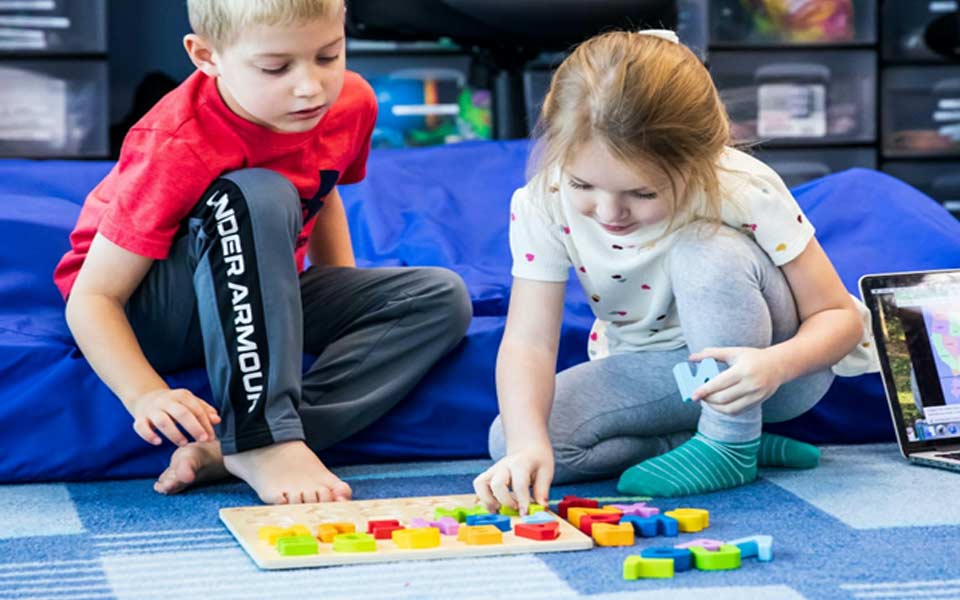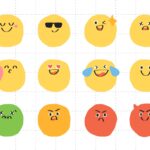IGNITE is an ABA daytime preschool-like program designed for kids ages 2-6 with Autism. It is a school readiness program that will help children gain the skills necessary to learn in a group environment. Each child receives 1:1 instruction to help teach the skills needed to be successful in the least restrictive school setting.
If a child with Autism displays deficits in the area of social skills, attending, play skills, or following directions, the school may be a difficult setting for them to be successful in. IGNITE allows a child to learn the necessary skills to be successful and learn them at a rate and in a way that is comfortable for them.
IGNITE gives children with Autism the chance to shine and learn skills they may not acquire in a typical preschool classroom.
At Westside, children learn social skills through a variety of activities — some individually and some in group settings. A majority of these skills are ones that could be expected of a child in a classroom setting.
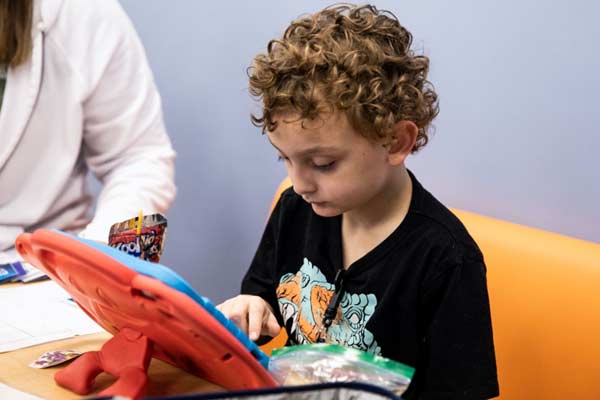
Some key social skills that will be learned in IGNITE include:
Following group instructions, turn taking, waiting, transitioning between activities, sitting appropriately, and attending to tasks and instruction. Additionally, this program focuses on functional play skills, social skills including approaching peers and exchanging greetings and conversation, recognizing authority figures, and more.
What sets Westside’s ABA program, IGNITE, apart is the fact that while working on all of these skills, it is always 1 on 1. Even during group play, each child has their own therapist. Goals may be the same for each kid in the group, but how and when they reach their goals can be very different.
Each child also has their own, individualized therapy program to work on attaining different skills that may be difficult for them. Some of these skills could include following directions, respecting personal space, working with others, tolerating losing, asking for help, and communicating. A variety of group activities are run each day to help children learn cooperative play skills, sharing, following group instruction, and being flexible.
With the 1 on 1 attention, we will target skill deficits for each individual child in a way that allows them to learn the skills. For example, engaging in reciprocal conversation. First we work on gaining another person’s attention. Then we would work on the turn taking.
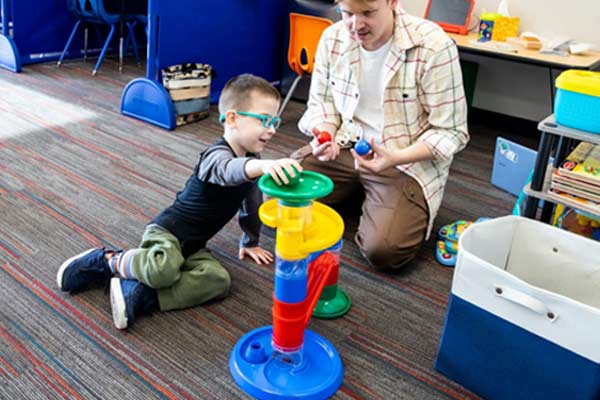
How a program may look different from one child to another
There are many ways our therapists can specialize a program for a child. Art is just one way. Additionally, each child has a program that is written based on their skill deficits.
Each month is a different theme. One day, the art project may be painting using Q-Tips. But maybe for a child who has poor fine motor skills (skills involving the use of the smaller muscle of the hands, commonly in activities like using pencils, scissors, etc.), they will use a cotton ball to make it easier.
Each kid is working on the same project as they would in a typical school setting, but the 1 on 1 attention and individualized programming allows the child to complete the activity in a way that is comfortable for them.
Another example has to do with communication. Not every child can/will communicate the same way, but every kid has the right to be able to communicate in a healthy, appropriate way.
How we practice communication in group settings in IGNITE:
Throughout the day, there are a variety of activities that take place to help children practice their communication skills. “Circle time” is an interactive time where kids get to sing, dance, learn about the weather, emotions, and practice greeting their peers.
Kids will take turns going around the circle to say the month, day, year, etc. Some will speak it, but some may not be able to. So, we adapt and they use their augmentative and alternative communication device (AAC) or Picture Exchange Communication System (PECs) to communicate with their peers.
We’re always able to adapt for one child because we have the 1 on 1 attention.
Giving kids a voice also helps them work on their functional communication skill which will help decrease problem behaviors.
Even more help is right there when needed
At Westside clinics, we have other therapies and therapists available in the clinic. Sometimes, a child in ABA will also receive Physical Therapy, Occupational Therapy, and/or Speech Therapy, but if they don’t, our ABA therapists can still collaborate with those other disciplines to support your child in IGNITE.
Assuming the child does not already have speech therapy, for example, we will work with the speech team in the clinic to get them PECs.
The hope is that if they do enter a typical school environment, they have a form of communication that works for them.
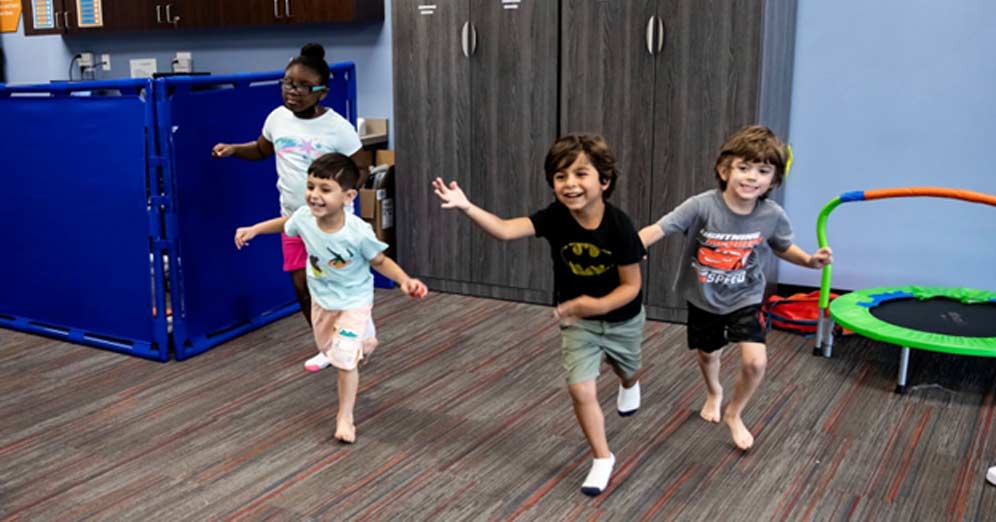
Kids learn best through play!
No kid, or adult, wants to be just told what to do.
In IGNITE, we also work on increasing imitation skills. But we’re having fun doing it.
During circle time, we may listen to a song and follow along with the song to learn imitation skills. If the child is having fun while watching their therapist do it, they will be more inclined to follow along as well.
Then, as they begin to learn the song and practice some more, then maybe they will begin to imitate their peers and learn from them.
These skills can open a whole new world for a child.
And we learn by playing together!
This may take some time for some children to be comfortable with. We work on the children being able to tolerate sitting next to their peers in circle time and then we work on “cooperative play” which means playing a game together that requires turn taking/working together to play.
For example, a game like duck, duck, goose is a cooperative game. Taking turns shooting a basketball, playing a board game, or playing catch are also examples.
And if we’re learning to take turns playing catch back and forth, we will theme it with the season. If it’s summer, we may toss water balloons. If it’s winter, we may toss “snowballs” back and forth.
If we can take turns in a fun way, children will be more willing to do it. And then we can get to a point where the children are asking each other “do you want to play tag? Chase me.” “Do you want to play catch?”
All these skills are crucial for social development.
BUT… We also want kids to gain independent skills as well!
A key part of IGNITE is following a direction, especially by someone who is an “authority” figure (teacher, therapist, parent, etc.). And to take that direction and act on it.
We also try to teach that if a child did not hear what the “teacher” said, they are able to ask a peer for help.
A key independence skill we look to have children develop is to increase attending skills (coming to circle time because they want to). This is where modeling and imitation can also come into play because if the kids see their friends do it, they may want to as well.
We are in constant communication with you
Our therapists will always talk with you before and after every session on what we are working on and how things went that day. It is also a time where you can ask questions and we can give you suggestions on what to work on at home
We also utilize Brightwheel at Westside Children’s Therapy.
Brightwheel is an app that allows parents to get updates about what a child is doing throughout the day. A picture is worth a thousand words and that is exactly what you get! Pictures of social interactions and activities that a child is doing throughout the day.
With Brightwheel, we can send you pictures throughout the day of what your child is working on.
If you want to Get Started with ABA and IGNITE at Westside, click below, or call (815) 469-1500 and our team will be happy to help get the process started.

